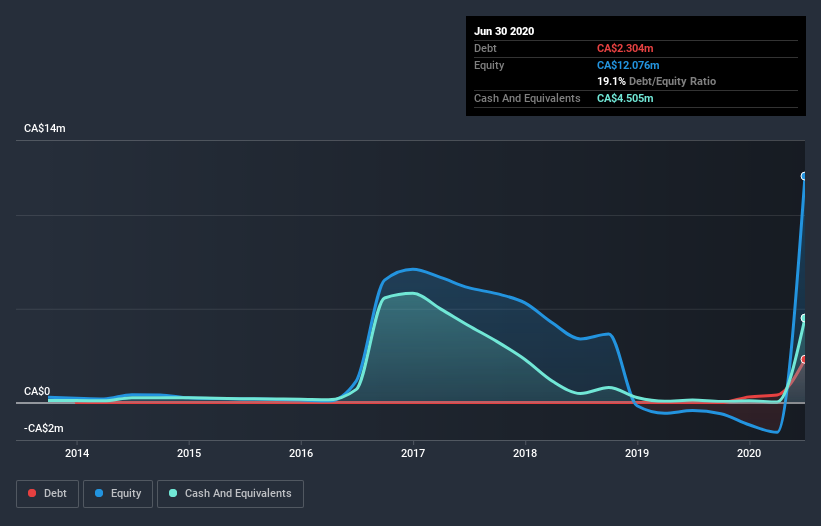Is Playgon Games (CVE:DEAL) Weighed On By Its Debt Load?

Howard Marks put it nicely when he said that, rather than worrying about share price volatility, 'The possibility of permanent loss is the risk I worry about... and every practical investor I know worries about.' So it seems the smart money knows that debt - which is usually involved in bankruptcies - is a very important factor, when you assess how risky a company is. We note that Playgon Games Inc. (CVE:DEAL) does have debt on its balance sheet. But the more important question is: how much risk is that debt creating?
Why Does Debt Bring Risk?
Debt and other liabilities become risky for a business when it cannot easily fulfill those obligations, either with free cash flow or by raising capital at an attractive price. If things get really bad, the lenders can take control of the business. However, a more usual (but still expensive) situation is where a company must dilute shareholders at a cheap share price simply to get debt under control. Of course, the upside of debt is that it often represents cheap capital, especially when it replaces dilution in a company with the ability to reinvest at high rates of return. When we think about a company's use of debt, we first look at cash and debt together.
View our latest analysis for Playgon Games
What Is Playgon Games's Net Debt?
You can click the graphic below for the historical numbers, but it shows that as of June 2020 Playgon Games had CA$2.30m of debt, an increase on none, over one year. But on the other hand it also has CA$4.51m in cash, leading to a CA$2.20m net cash position.
How Healthy Is Playgon Games's Balance Sheet?
Zooming in on the latest balance sheet data, we can see that Playgon Games had liabilities of CA$3.64m due within 12 months and liabilities of CA$1.36m due beyond that. On the other hand, it had cash of CA$4.51m and CA$139.9k worth of receivables due within a year. So it has liabilities totalling CA$354.4k more than its cash and near-term receivables, combined.
This state of affairs indicates that Playgon Games's balance sheet looks quite solid, as its total liabilities are just about equal to its liquid assets. So it's very unlikely that the CA$61.0m company is short on cash, but still worth keeping an eye on the balance sheet. Despite its noteworthy liabilities, Playgon Games boasts net cash, so it's fair to say it does not have a heavy debt load! When analysing debt levels, the balance sheet is the obvious place to start. But it is Playgon Games's earnings that will influence how the balance sheet holds up in the future. So when considering debt, it's definitely worth looking at the earnings trend. Click here for an interactive snapshot.
It seems likely shareholders hope that Playgon Games can significantly advance the business plan before too long, because it doesn't have any significant revenue at the moment.
So How Risky Is Playgon Games?
By their very nature companies that are losing money are more risky than those with a long history of profitability. And the fact is that over the last twelve months Playgon Games lost money at the earnings before interest and tax (EBIT) line. And over the same period it saw negative free cash outflow of CA$1.4m and booked a CA$3.0m accounting loss. With only CA$2.20m on the balance sheet, it would appear that its going to need to raise capital again soon. Summing up, we're a little skeptical of this one, as it seems fairly risky in the absence of free cashflow. When analysing debt levels, the balance sheet is the obvious place to start. However, not all investment risk resides within the balance sheet - far from it. Consider for instance, the ever-present spectre of investment risk. We've identified 5 warning signs with Playgon Games (at least 3 which are significant) , and understanding them should be part of your investment process.
If you're interested in investing in businesses that can grow profits without the burden of debt, then check out this free list of growing businesses that have net cash on the balance sheet.
This article by Simply Wall St is general in nature. It does not constitute a recommendation to buy or sell any stock, and does not take account of your objectives, or your financial situation. We aim to bring you long-term focused analysis driven by fundamental data. Note that our analysis may not factor in the latest price-sensitive company announcements or qualitative material. Simply Wall St has no position in any stocks mentioned.
Have feedback on this article? Concerned about the content? Get in touch with us directly. Alternatively, email editorial-team@simplywallst.com.


